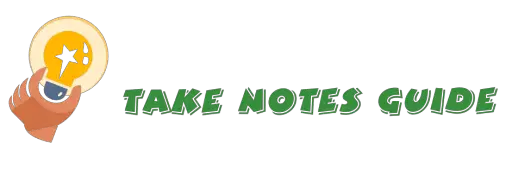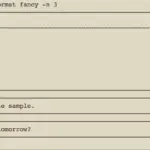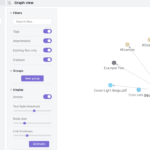To begin with, being on the point is a good start to taking good notes! To know why and how people take good notes, we breakdown the causes and conditions leading to it. When we keep stacking up advantageous conditions to our favor, naturally our chances of this happening will increase, like everything else. In short, we analyze and brainstorm for substantial factors and conditions so we can take appropriate steps to increase the positive factors and minimize or avoid the negative ones.
Summary factors on how to take good notes:
- Pithy notes method
- Learn more note-taking methods and apply the right one (I did the hard work on TakeNotesGuide, ripe for your fruit plucking 🙂)
- Willingness to learn and utilize different note-taking apps for various ends (optional)
- Avoid and let go of negative emotions and nurture positive ones such as love, kindness, sympathy, and compassion
- Be diligent, persevere, work for it despite your obstacles. Attitude is key.
- Take fruits, veggies, nuts, legumes and green tea
- Exercise, get enough sleep and clean water
I believe there are methods to better note-writing, just as there are templates to help us write different types of content. For example, I write in a designated format I learned; We can write a post in any way we like, but it may not be as effective as in certain tested format. Having a sensible game plan to note-taking is better than none, which can be improved over time to better suit your preference and style. The goal of this site is to provide a note-taking base to kickstart this process. Simplicity works. Read on to find out what is the pithy notes method and other helpful factors for taking good notes.
Pithy notes method
This is a way I want to share for notes takers in a class or meeting. I call this pithy notes. Taking too many notes can distract one from understanding. This may look basic but a strong foundation is essential to good note-taking.
- Either you take a one or two sentence notes around every 15 minutes or so apart on anything important you learned and questions you have (Beginner). For example for a 10 am class, look at the time at 1015, 1030, 1045 and 1100.
- Or you just write down everything you deemed important at the end of the lecture (Intermediate)
- Or you only take mental notes of important concepts (Expert)
- This way you focus all your attention on understanding in lectures and nothing else. This kind of notes are very short but to the point. Thus pithy notes. (Just focus on understanding)
- For best results, take photos (preferred) or audio clips with permission. You may just only take photos (visual notes) of important points without writing any notes so you focus solely on understanding. This is not only for visual memory but also help to confirm our correct understanding and other key ideas we might have missed out.
- Go through these pithy notes during meal breaks or recess and on your way home waiting for the bus or on a train. Quickly reflect and google first or ask questions you do not understand. That way you take smart notes and do not waste time. (Review and ensure)
- Since pithy notes are very short, commit to memory by recollecting that note content 3 or 4 times.
Note:
- Study the text before will help make better and more effective use of your time and understanding during the lecture or class.
- Attend every class or lecture (so you do not miss any important points).
- Resist the temptation to take immediate notes every time something is shown or said. Practice making mental notes so you can understand, organize and remember before noting it down later.
- Do not look at your notes when walking, this is dangerous. And bad for eyes taking notes on a shaking bus. Listen to audio notes instead.
Alternatively, if there are simply too much to learn for that session or chapter (do not expect all chapters to be equally challenging), you have 2 choices:
- Either split up the chapter into 2 or 3 parts or
- Take a lot of notes in the first session, and condense them into a much shorter version in the second session of revision.
Simple exercise:
- Read a paragraph of text and summarise into a short sentence
- Read the next few paragraphs and summarise into one or two sentences
- Finish reading the whole chapter and summarise into a few sentences
- Apply a pithy notes method for another chapter
- Listen to a short audiobook for about 5 minutes and summarise into a short sentence
- Listen to the following 10 minutes and summarise into one or two sentences
- Finish listening to the short audiobook and summarise into few sentences
- Apply a pithy notes method for another audiobook
Note: This experiment should reveal somewhat what you may or may not prefer. You may prefer to summarise just one or a few paragraphs. You may like to do at 10 minutes interval, at the end of a session or just take mental notes all the way. You may prefer listening to reading. How do you like to take your notes? Which is the most effective for you? The point is to get to know yourself better and use this to your advantage.
How do I know I have succeeded with the pithy notes method?
When you know what is the one main and most important point about the chapter (and from there you can expand out to other details) and what to accomplish.
From here based on understanding, one may take the next step to memorize depending on how much detailed information to remember; Please read More Than 10 Ways For Taking Notes To Memory But Never Stop Improving.
However, it would be excellent if you can go beyond what is asked and taught. Some ideas from Breakthrough With 10+ Creative Note-taking Ideas may help to discover more on the matter and deduce possible future potentials and applications. After all, we should be learning knowledge for the right purpose from pure altruistic, academic, and entrepreneurial perspectives. I hope you agree.
Other note-taking methods on TakeNoteGuide
Having mastered the basics of taking good notes, perhaps it is time to learn more approaches if you wish. Below are just some previous ones posted that I can think of.
- Reverse Engineer methodology for targeted usefulness research first in How To Take Notes For Research Paper.
- Divide-and-conquer for a big-to-small perspective of digesting a huge chunk of information in How To Take Notes For Computer Science
- Random page method for inspirations ideas of a new novel in How To Take Notes On A Novel
- Develop one’s own note-taking methods for advanced notes-takers in Who Else Wants Note-taking Tips?
Each method/approach has its purpose and advantages. For example, notes taken with the reverse engineer methodology can be very different from other approaches by being specifically targeting applications of the topic first and possibly changing the initial direction of the topic researched. When one read and take notes in this particular way, he focuses on looking out for benefits and applicability and discard others in favor of the chosen topic. This kind of notes can be a list of benefits, advantages, and reasons for the chosen topic. Compare before specialization (like researching which mountain to climb).
If you are interested, please feel free to experiment the reverse engineer methodology approach by applying on the different chapters of a textbook for example, and you should have a list of chapters notes revealing to you how important or useful each chapter to you, and this little exercise may even help you decide your possible future career specialization paths and which chapters you will pay more attention to excel (like evaluating the merits of the various stops and rests along the way e.g. scenic view, camping ground, waterfall, etc).
And having decided your field of topic specialization (the mountain to climb), you may start with the Divide-and-conquer way of taking notes by dividing the whole topic into milestones (resting places and stops on the way up) and even to each and every mini-practical tests and theory (each individual steps). Having a road map in this way will give one a realistic overview of where is one currently and how to get to the top. The notes taken here will have a place as part of a whole (a sense of belonging like the road signs along the hiking path). Furthermore, at this point, he may wish to take notes with the intentional purpose of committing to memory (like a GPS map app that tracks and records our past latitude and longitude destinations) e.g. More Than 10 Ways For Taking Notes To Memory But Never Stop Improving.
Perhaps months or years after you graduated, you wish to write a novel or non-fiction book and looking for some inspirations to start off, you might deploy the Random Page Method to take notes for ideas and possible improvements for a new book (Exploring new mountains trails or hills paths).
Those who write and take notes frequently should already have a clear idea of what works for them or not, then this may be the time to make a conscious effort to develop their own note-taking methods by systemizing their note-taking efforts in replicable steps like a formula (Your favorite mountain or hill path that delivers the most satisfaction).
Willingness to leverage different note-taking apps (optional)
One may reserve a particular app for each or more purposes. For example:
- Evernote for general and audio notes; A Modern Guide To Note-taking Basics, Beginner’s Guide To Taking Notes On Computer
- Gingkoapp for a thesis; How To Take Notes For Research Paper
- Zotero for citations and bibliographies and take notes; How To Take Notes For Research Paper
- Google keep for general notes
- Apple notes for simple notes e.g. One-time todo list
- StackEdit for markdown; Markdown Editors For Note-taking
- Postach.io to blog your Evernote notes and WordPress for your long and dedicated posts grown from notes.
Another way to leverage on note-taking is with templates. Some posts have ready templates, for example, How To Take Notes For A Meeting. Those who prefer taking notes by hand can get a Rocketbook, write and scan to the cloud, erase and reuse (affiliate link).
Browse with Researcher Android app to discover and read research papers and studies; How To Take Notes For Research Paper. Create quick videos with text or notes for sharing, consider Quik Android app or Lumen5 in Top 17 Ways How To Take Notes For Sharing. Smashwords to publish and distribute your ebook and Gitbook to create elegant documentation.
Tip: You may take faster notes if you prefer speaking to typing with Google Doc’s voice typing or Evernote’s Dictation, read more in Beginner’s Guide To Taking Notes On Computer.
Positive Factors contributing to taking good notes
- Talent or aptitude
- Attitude – Perseverance and open to new and better ideas
- Physical body condition of that day – Maintain your body in good balance
- State of mind for the day – Fill ourselves with kind and loving thoughts towards others
- Knowledge and selection of notes-taking methods – Learn from resources such as TakeNotesGuide and/or even create your own method. Avoid using an ineffective method that may even kill your interest.
- Training of a particular method suitable to an individual (knowledge without application is useless information) – Take consistent action to practice your note-taking skill.
Strong negative factors debilitating to overall well-being, including note-taking
- Avoid and let go of negative emotions and actions such as anger, jealousy, prejudice, and bias; Refrain from committing misdeeds or sin against others. Do not give up even when it feels hard to do so. Learn to walk away or stop ourselves from hurting others. Be loving and kind to others without expectation of return instead.
- Laziness and expecting hand-outs for life.
- Financial and other personal burdens. Life can be hard. You are not alone. Do whatever your situation allows, take paper notes or mental notes when you can. Attitude matters a lot. Be diligent and patient. Perseverance is also a key to success.
We all face hardships in life, some more than others. I understand these negative emotions can be challenging at times, but our only good way out is to not succumb and overcome them. Who can be patient and virtuous for us except ourselves?
Be nice and honest
Our mood may affect our performance, you may find some ideas under the mood section of Breakthrough With 10+ Creative Note-taking Ideas. People who are jealous and busy backstabbing and slighting others may find it hard or impossible to concentrate on anything else other than the endless cycle of vicious thoughts. On the other hand, we can start with kind thoughts and words for those around us, and exercise tolerance and patience even when others do not. We can choose how we react to any situations, be it note-taking or any life decisions. We can make donations to authentic charitable causes even if we do not socialize much. Be honorable and kind.
If you are required to answer a question for note-taking or otherwise, reply honestly and directly without circumvention. People may detect insincerity or disagree straight off when your replies are not or only somewhat relevant to what is asked. People will realize when they are lied to, just a matter of time. When we take notes, we are keeping a record of what transpired, so the speaker cannot claim otherwise when the public have the same understanding and documentation. So the next time we speak or take notes, tell the truth (does not mean we have to say everything we know if we do not have to) and detect inconsistencies both orally and from your notes. Take notes relevant to your topic, even the humorous parts but ignore irrelevant information or short episodes that derails. Optionally, please check out courses that teach us to detect lies in Resources.
Set The Right Expectation
When we do not feel positive about studying, taking notes or be productive, we should address and acknowledge all our own shortcomings and circumstances first. It is entirely possible our mood can be adversely influenced by an external factor such as an aggressor despite not being our direct fault. Acknowledgment is a realistic first step to taking account and responsibility for our actions and situation.
There are two ways to we deal with this:
Firstly, be patient. Let it be, remain calm and taking everything in its strides. Continue as usual in your positive efforts and let go of the negative emotion.
Second, do nothing constructive or destructive. Wait for the bad day to pass and start anew tomorrow.
Either way should help to have the right mental attitude to focus, and then we can start taking good notes consistently and for future endeavors without quitting easily. We may plan and expect ourselves to study and take notes for hours every day, but we may end up doing less due to external obstacles or our attention span just may not be as long as we hoped. The solution is to simply persevere and repeatedly pull ourselves back to finish the task.
However, we can choose to engage in some harmlessly fun and relaxing activities before resuming. Some ideas for relaxing activities/hobbies include:
- Playing with family and pets
- Reading your favorite books
- Watching some TV series/movies
- Listening to your favorite music
- Walking, jogging, and swimming
- Birds feeding
- Gardening
- Kite flying
- Drawing and painting
- Playing the piano and other musical instruments
- Woodworking
- Pottery
- Sewing
- Computer programming
Planning for longer-term
We are not aiming to take just one good note for today and then when we encounter obstacles and the unexpected we fail to plan for, we falter, question our own success and give up. Everyone’s situation is different. We just need to know what can happen and prepare for it. Do not look for an umbrella only when it starts raining. Taking good notes is no different, we plan ahead. List down what may deter you from taking good notes, and how should you react to it.
A prolonged period of note-taking for success is essential so we do not give up too soon before seeing substantial results with the right timing and opportunities. While external circumstances are beyond our control, we can put consistent efforts into regular note-taking i.e. with calendar reminders.
Food and drink for mental acuity
- Fruits and veggies. Take more fruits varieties and green salads.
- Nuts and legumes
- Tea. This article claims it can boost memory, keeps one alert, attentive, and more productive.

Note: Green chili boost both moods and blood circulation – this I consider good for creative writing. And may spice up dull boredom. Chilli also has other health benefits like fighting some cancer, relaxant, loaded with vitamins, lower blood sugar levels and helps to burn fat.

One simple good body exercise daily routine
- Simple stretching and rotation motions for seconds
- Stand up with legs almost straight, bend over and head reach for toes for seconds
- 10 squats or stationary half-squats
- 10 weights or kettlebell lifts or bench press reps.
Even a simple workout a day can make a difference to one’s health over time. Heavy breathing is good. Home workout as such can be fast and effective. Others may prefer a short jog, walk up the hill or cycling around the neighborhood.
Take Action
Takenotesguide writings are meant to help you attain your good note-taking goal, but the research and time spent on these posts can only be a personal recommendation. You still need to take action for any results. Inaction begets nothing. See if the pithy method for note-taking works for you! You might even apply to it to other aspects of life.
Beginners may set aside 10 minutes to an hour of reading, listening and note-taking per day. And accumulates experience consistently over months or years. For example, children may be easily distracted but adults are trained and able to concentrate for hours on a task daily.
Conclusion
How to take good notes is actually in essence how to understand or better the subject matter before we take notes. Note-taking is just a guide or tool to help us achieve that but it should not be the only way to do it, which is why there are different factors mentioned in this post. Please bear these factors in mind and put the pithy note method to good use and purpose.
There is something beautiful about just being able to write anywhere with just typing away on a smartphone. Less at the mercy of forgetfulness when there are so many ideas we have to note down. We can write our notes anywhere we go. Take a notebook or smartphone to write or type on. Record your voice when we cannot or should not write. Convenience has changed the note-taking landscape and culture.
May this post be a spicy start to heat up your note-taking tastebud, and break your creative juices into a running sweat! Good luck and be kind.
Related Questions
Are you sure this method will work for me?
I do not know for sure any method will work anyone. You have to discover and know yourself better. For example, I find myself comfortable with and gravitating towards a certain method of note-taking or writing given my situation after some time. Even then I am not sure how long or consistent it will last, but I believe we should keep working hard towards success. You may be interested to Revolutionize With Different Ways To Take Notes.
Too stressed out to take notes?
As long as we did what we can within our ability in good conscience, there’s no need to worry about factors beyond our control; That also means figuring out the root cause for why we are stressed out and reflect upon it logically and make contingency plans. Take a short break if necessary and come back later.
Please also read How To Reduce Study Stress For Students And Adults.
When to take a break from taking notes?
When you feel mentally tired and out of ideas. This may come with the experience of knowing any more sitting there staring at the book or computer will not yield any more results. When you reach that state of mental exhaustion, take a break quickly to save you time from an unproductive session.
How to choose and drink green tea?
- Organic green tea or even better Japanese matcha (powdered young green tea leaves) is preferred.
- Quality matcha is bright green and smooth, premium brands of matcha have been tested to be clean from lead and matcha tea benefits here.
- Test first by putting a green tea bag in room temperature water for a few seconds to observe for colorless diffusion. Good tea should not have chemical color additives.
- Water temperature should be about 170 – 185 degrees Fahrenheit (76.67 – 85 degree Celsius).
- Drink in the morning on an empty stomach undiluted by other drinks or food
- Stir or dip repeatedly to achieve a more consistent and stronger flavor.
- Drink slowly with a relaxed mood.
For more ideas, please read 10 Ideas When To Take Notes.

Are there any games and books for teaching or encouraging teens and children to take notes?
Please read Top 9 Fun Activities For Note-Taking and Resources.






